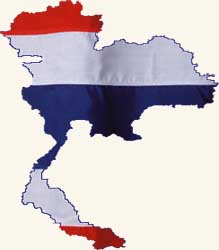Thailand deports Hmong refugees despite international concerns
 Bangkok, Dec 28 - Thailand Monday began deporting 4,000 ethnic Hmong refugees to Laos despite international appeals to the government to reconsider the involuntary repatriation to an uncertain future.
Bangkok, Dec 28 - Thailand Monday began deporting 4,000 ethnic Hmong refugees to Laos despite international appeals to the government to reconsider the involuntary repatriation to an uncertain future.
The first batch of 442 Hmong were taken from Huay Nam Khao camp in Phetchabun province at 9.30 a. m. to buses that will carry them to Nong Khai province where they will cross the Mekong River on the Thai-Lao Friendship Bridge into neighbouring Laos, said Thai Army Colonel Thana Jaruwat, spokesman for the Internal Security Operations Command.
The remaining 3,600 have thus far refused to leave the camp peacefully, he said.
"We will try to convince them to leave on their own will but if they refuse we will enforce the law," Thana said.
Thailand has never recognised the Hmong at Huay Nam Khao, 280 km north-east of Bangkok, as refugees but instead has classified them as illegal migrants, who, according to Thai law can be expelled without bringing charges against them, Thana said.
Officials from the United Nations High Commissioner for Refugees (UNHCR), other human rights workers and journalists were held several km away from the camp to prevent outsiders from observing the mass deportation operation.
"If the Hmong see journalists they will do themselves harm to make a scene and we don't want that," Thana said.
The US government, the UNHCR and the European Union all urged the Thai government to reconsider its deportation plans but to no avail.
"This is unfortunate and indefensible and we're very concerned about it," Eric Schwartz, the US assistant secretary of state for population, refugees and migration, told DPA.
Thailand and Laos agreed months ago that the Hmong at Huay Nam Khao camp must be deported by year-end. The Lao government announced on state TV Sunday night that the returning Hmong will be treated humanely.
"The government of Laos has a great opportunity now to demonstrate a policy of humanitarian treatment for those who have returned," Schwartz said.
Preparation for the mass deportation began last week when the Thai army, which controls Huay Ban Khao, confiscated all sharp objects and mobile phones from the 4,000 Hmong residents, some of whom have lived in the camp since 2004 hoping to be resettled in third countries.
The Hmong, an ethnic minority which has inhabited the mountainous northern region of Laos for centuries, were recruited as guerrilla fighters by the US military in its "secret war" against communist forces in Laos.
The communists prevailed in 1975, and the Hmong were left behind. Unknown thousands fled to neighbouring Thailand since 1975 and sought resettlement abroad.
In 2003, the US agreed to take 14,000 Hmong who had lived for years at Tham Krabok temple in north-east Thailand. Since then, some 8,000 more Hmong sought refuge in Thailand, claiming persecution at home.
About 3,000 refugees returned to Laos voluntarily in 2008-09. Thailand insists the remainder must be deported to prevent the country from being a magnet for more Hmong migration.
"There are ways to try to discourage economic migrants but you cannot decide by fiat one day that people are going to stop crossing the border when they need protection," Schwartz said.
Besides Hmong, Thailand has attracted more than 1.5 million refugees from Cambodia, Myanmar and Vietnam over the past four decades.
The Thai government has been criticised for not allowing UNHCR to determine the Hmong's eligibility for refugee status. At least 158 former Huay Nam Khao residents, now in a detention centre in Nong Khai, have been classified as "people of concern" by the UN agency.
Despite claims of concern, no foreign country has expressed interest in accepting the Huay Nam Khao community.
To date, the Lao government has not invited the UNHCR to work in the country, nor to monitor the Hmong repatriation process, although foreign embassy staff in Vientiane have been brought to resettlement camps where some of the 3,000 Hmong who returned have ended up. (IANS)